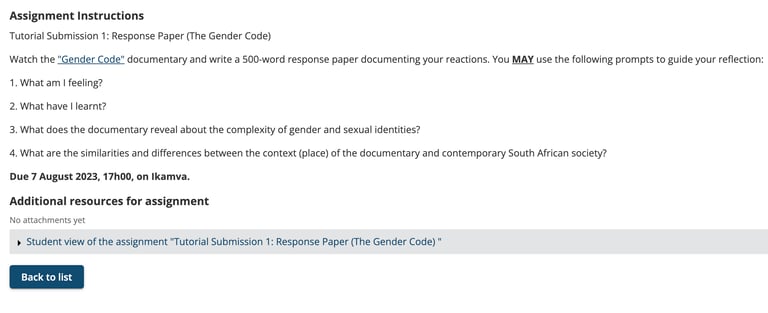Teaching Practice
I view my role in the classroom as that of a lecturer-coach, a facilitator who inspires students to actively engage with their learning, develop critical thinking skills, and connect theory to lived experience. This pedagogical approach has been shaped by my experience teaching a diverse array of courses across institutions such as Stellenbosch University, the University of the Western Cape, and the University of Cape Town. My teaching has encompassed topics including race, class, gender, social inequalities, stratification, health disparities, social development, welfare policy and practice, research methodology, social theory, crime, and violence.
This breadth of subject matter, combined with the diversity of student backgrounds, has heightened my awareness of the need for inclusive, responsive teaching strategies. I am deeply committed to recognising and integrating students’ existing knowledge, cultural contexts, and varied learning abilities into the learning process. I intentionally select course materials and design learning activities that are intellectually rigorous and socially relevant, encouraging students to explore perspectives beyond their comfort zones while taking ownership of their educational journey.
Interdisciplinary connections are a key component of my classroom practice. Through carefully designed discussions and collaborative tasks, I encourage students to draw links between concepts across the social sciences, development studies, health, economics, and education. Collaborative learning, particularly peer-to-peer interaction, is central to my teaching philosophy. I frequently incorporate small-group or paired activities to promote reflective dialogue and enhance students’ communication and intercultural competencies. Student feedback consistently highlights the value of engaging with peers from diverse backgrounds as one of the most enriching aspects of my courses.
Both in-person and virtual learning environments are supported through robust use of Learning Management Systems (LMS), which enable ongoing, flexible engagement with course content. Whether lecturing to large undergraduate cohorts of over 1,000 students or facilitating focused postgraduate seminars at the honours and master’s levels, I apply this philosophy consistently. My approach has been affirmed through consistently high teaching evaluations and positive student outcomes.
A defining element of my teaching is the integration of contemporary research and current debates, ensuring course content remains dynamic and relevant. Returning to the idea of the lecturer-coach, I draw on my own experiences of being coached to support students' academic and personal development. By incorporating regular progress assessments and providing constructive, developmental feedback, I aim to foster a growth mindset and a culture of continuous improvement. I have witnessed firsthand the transformative impact of this approach on student performance and confidence.
Multimodal Teaching Practice
Incorporating multimodal teaching methods is central to my commitment to creating an inclusive, engaging, and effective learning environment. Recognising that students absorb information in diverse ways, I integrate a range of media, text, video, audio, visuals, and interactive discussions into my courses, including Contemporary Social Worlds (SOC152), Applied Sociological Research and Theory in Africa (SOC233), and my Postgraduate courses. This approach offers multiple entry points into complex sociological concepts and enhances accessibility for learners with different preferences and needs.
While foundational readings provide theoretical grounding, I complement them with relevant documentaries, YouTube content, and podcasts that bring abstract ideas to life. For example, when exploring issues such as gender, race, and identity, I include audiovisual material that presents lived experiences and global narratives, helping students connect emotionally and intellectually with the subject matter.
Interactive lectures and tutorials are designed to foster collaborative learning and critical reflection. Through group-based activities, case studies, and discussion prompts, students are encouraged to apply theory to real-world contexts and reflect on how these themes intersect with their own lives. This practice enhances understanding and cultivates empathy, particularly in sensitive or identity-related topics.
I also make strategic use of technology to support flexible, self-paced learning. By providing online access to lecture slides, video summaries, and glossaries, I enable students to revisit content and engage with materials beyond the classroom. These digital tools not only enhance comprehension but also promote equitable access to learning.
Student feedback has consistently affirmed the value of this approach, highlighting the impact of multimedia resources and interactive learning on their engagement and comprehension. Looking ahead, I am committed to expanding my use of innovative tools, such as interactive simulations and virtual guest lectures, to ensure that the learning experience remains dynamic, relevant, and transformative.
These clips demonstrate my approach to incorporating YouTube videos to enhance student engagement and contextual understanding in my courses. Students were tasked with watching the documentary on "Gender Code", and the Hyundai Staria advertisement, and write a response paper documenting their reactions.


Multimodal Teaching at the Undergraduate Level


Multimodal Teaching at Postgraduate Level
Video: A student integrates her passion for photography into our class sessions by thoughtfully capturing moments from class presentations.
Video: A student delivering a presentation that incorporates music to express herself, convey her research, and evoke emotions among her classmates.
Students were tasked with developing a decolonised curriculum as a group assignment. This is an example of one of the submitted assignments.
